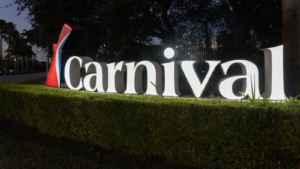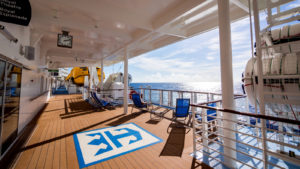Although a slight retreat is probable, I’m a lifelong optimist. As such, a drawdown will open up numerous value gaps in the cruise stock arena. Additionally, the northern summer is approaching, which phases fundamental tailwinds into the equation.
Considering the aforementioned, here are three cruise stocks that could present excellent “buy-the-dip” opportunities.
Carnival Corporation (CCL)

Carnival (NYSE:CCL) endured a torrid time during the COVID-19 lockdowns. I recall some of the company’s corporate debt offerings yielding between 14% and 16%, which was scary at the time as it reflected sectoral liquidity issues. However, re-openings paired with solid managerial execution dragged Carnival’s income statement back into respectable territory, leading to a year-over-year stock price surge of more than 70%.
Despite having reached greener fields, Carnival’s stock has slipped by more than 10% in the past month. This communicates the risks mentioned in the introduction and conveys a technical retreat.
How can I be sure that CCL stock’s slump is technical? Well, Carnival’s fundamentals remain robust. For example, the company recently surpassed its first-quarter earnings estimates by tabling a $10 million revenue beat and an earnings-per-share (EPS) beat of four cents. Moreover, Carnival recorded $7 billion in customer deposits in the quarter, surpassing its previous first-quarter record by 5.38x. Therefore, a technical correction is the most likely reason for CCL stock’s recent slump.
The stock’s technical retreat leaves intrinsic value on the table. Carnival’s forward price-to-sales ratio of 0.78x conveys scalability and absolute value. Additionally, Carnival’s forward price-to-earnings ratio of 16.36x shows significant improvement over its 12-month trailing price-to-earnings ratio of 47.33x.
As the introduction mentions, a broad-based stock market retreat is likely in motion, adding headwinds to CCL stock. However, this looks like a tremendous buy-the-dip opportunity!
Lindblad Expeditions (LIND)

A key attraction of Lindblad (NASDAQ:LIND) expeditions is its breadth of services. The firm offers charters accommodating between 15 and 150 guests via its fleet of 15 ships. This provides Lindblad with lucrative revenue diversification and price discrimination abilities.
Lindblad stock has shed about 35% of its value since the turn of the year, communicating fundamental headwinds. Much of Lindblad’s demise is due to a recently announced $300 million shelf offering. In addition, Lindblad’s fourth-quarter earnings report revealed an earnings-per-share miss of 25 cents, dragging its stock down even further.
You might be asking why on earth I’d be bullish about LIND stock’s prospects.
I’m positive about Lindblad’s stock because I focus on trajectories instead of isolated results. For example, despite delivering below-par estimate-relative results, Lindblad’s full-year revenue settled at $569.5 million, surging by 35% year over year. Moreover, Lindblad’s segment available guest nights increased by 33%, while its net yield per available guest increased by 12%.
The abovementioned figures illustrate telling momentum. In fact, I’m willing to bet that they’ll proliferate when the northern summer is in full swing.
Lastly, consider that Lindblad stock has a forward price-to-sales ratio of 0.63x, which suggests that absolute value is in store. Market-based headwinds can have a temporary impact, but key metrics imply that LIND stock is a recovery play of note!
Royal Caribbean Cruises (RCL)

I’ve tracked Royal Caribbean (NYSE:RCL) closely, partially because I’m interested in booking a cruise and also because I’m impressed by its stock.
CCL stock has risen nearly 3% in the past month, sending it above its 10-, 50-, 100-, and 200-day moving averages. However, given the broad-based stock market headwinds, a break in its trend-line will likely occur. A slight drawdown would provide investors with an excellent contrarian investment opportunity; here’s why.
I want to start by saying that Royal Caribbean’s primary influencing variables are aligned. For instance, the firm upgraded its guidance last month due to a strong wave season that led to net yields of 19.3%. This led to Royal Caribbean setting its full-year earning-per-share guidance between $10.7 and $10.9, significantly higher than the street’s $10 consensus.
Furthermore, Royal Caribbean has best-in-class profitability metrics, allowing it to exercise economies of scale. For example, Royal Caribbean’s return on common equity ratio of 52.61% is approximately 3.63x above the sector median. I cannot stress Royal Caribbean’s profitability metrics enough, as they contribute to “throughout the economic cycle” shareholder returns.
Lastly, Royal Caribbean’s stock is well-placed from a capital markets perspective. As an example, RCL’s forward price-to-earnings ratio of 13.13x is at a sector median discount of about 17%.
RCL stock is a gem!
On the date of publication, Steve Booyens did not hold (either directly or indirectly) any positions in the securities mentioned in this article. The opinions expressed in this article are those of the writer, subject to the InvestorPlace.com Publishing Guidelines.
Steve Booyens co-founded Pearl Gray Equity and Research in 2020 and has been responsible for institutional equity research and PR ever since. Before founding the firm, Steve spent time working in various finance roles in London and South Africa. He holds an MSc in Investment Banking from Queen Mary – University of London. Furthermore, Steve has passed all CFA Levels and is working toward his Ph.D. in Finance. His articles are published on various reputable web pages such as Seeking Alpha, TipRanks, Yahoo Finance, and Benzinga. Steve’s articles on InvestorPlace form an interesting juxtaposition between mainstream opinion and objective theory. Readers can expect coverage on frequently traded stocks, REITs, fixed-income funds, CEFs, and ETFs.
